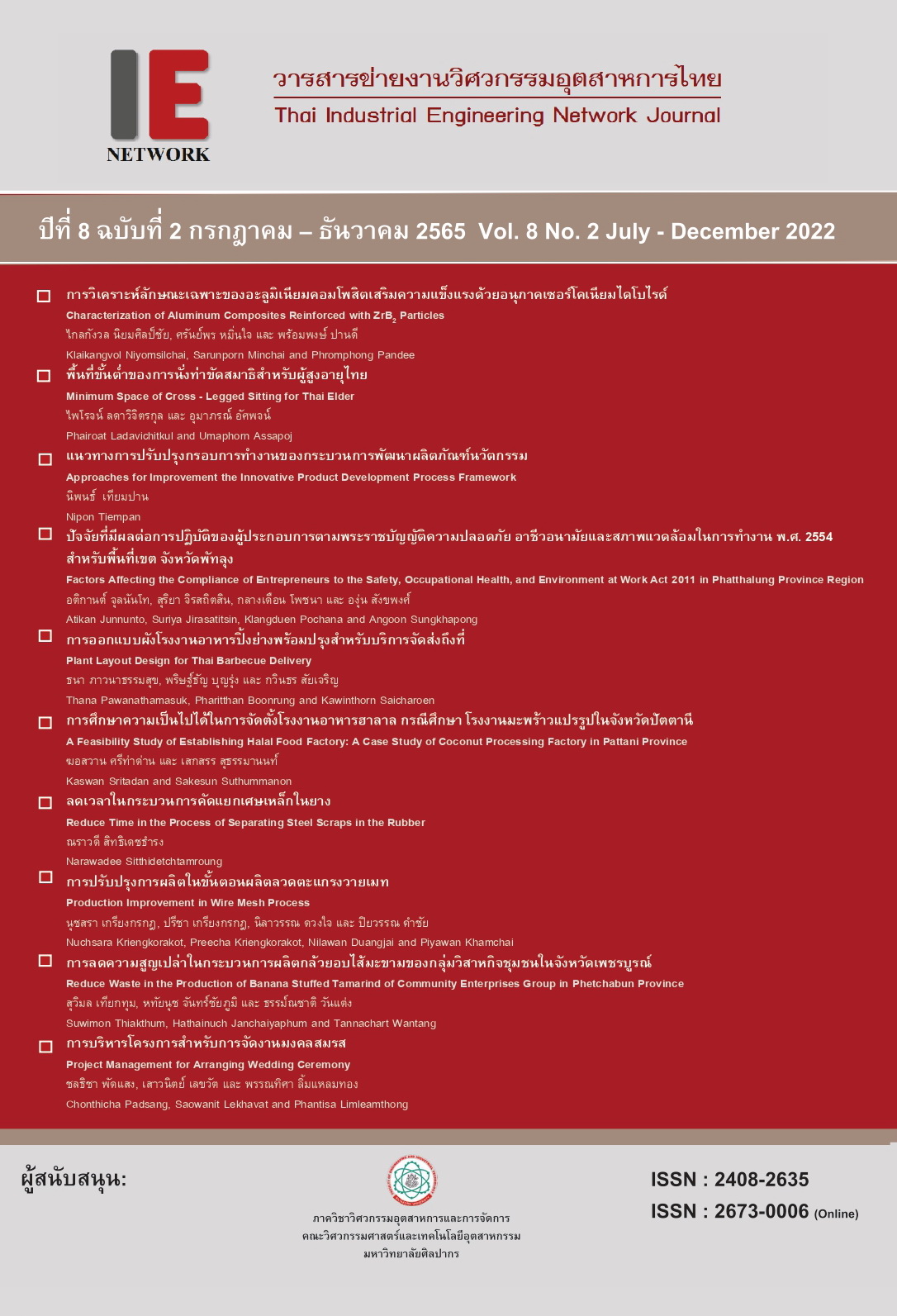Approaches for Improvement the Innovative Product Development Process Framework
Main Article Content
Abstract
The objective of this research is to study the factors supporting the product innovation development process and to propose a proposal for an innovative product development process framework of a case study company, a manufacturer of automotive parts. To be used as a guideline for the development of innovative products within the company more efficiently. This research employed both qualitative and quantitative methodology in which all data were collected from several sources including documents and in-depth interviews of the semi-structured from people involved in the company's product development process. By the conceptual assessment framework, the researcher has studied and reviewed the relevant literature. The research results identified that top managements emphasize driving factors including strategy of the product development process, innovation organization, cross-functional work, and sufficient resources. The researcher found a gap in the process of developing innovative products, idea generation process, innovation process, and voice of customer focus. So researcher proposed the product innovation development framework name is “The Fugle Innovation Process”. A framework that illustrates the workflow from conceptualization concept evaluation developing an ideas into reality and leading to commercial use on the basis of considering both internal and external contexts including support from the business strategy, knowledge management, organization management, and to encourage the innovative corporate culture. To support the implementation of innovative product development processes to be effective and sustainable continuous.
Article Details

This work is licensed under a Creative Commons Attribution-NonCommercial-NoDerivatives 4.0 International License.
บทความ ข้อมูล เนื้อหา รูปภาพ ฯลฯ ที่ได้รับการตีพิมพ์ในวารสารฯ ถือเป็นลิขสิทธิ์ของวารสารฯ หากบุคคลหรือหน่วยงานใดต้องการนำทั้งหมดหรือส่วนหนึ่งส่วนใดไปเผยแพร่ต่อหรือเพื่อกระทำการใดๆ จะได้รับอนุญาต แต่ห้ามนำไปใช้เพื่่อประโยชน์ทางธุรกิจ และห้ามดัดแปลง
References
สำนักงานวิชาการ สำนักเลขานุการสภาผู้แทนราษฎร. Academic Focus ประเทศไทย 4.0 [อินเทอร์เน็ต]. 2560 [เข้าถึงเมื่อ 3 ธันวาคม 2564]. เข้าถึงได้จาก:
https://waa.inter.nstda.or.th/stks/pub/2017/20171114-parliament-library.pdf
อาภารัตน์ มหาขันธ์. องค์กรนวัตกรรม:การสร้างวัฒนธรรมและระบบนิเวศนวัตกรรม.สถาบันวิจัยวิทยาศาสตร์และเทคโนโลยีแห่งประเทศไทย.[อินเทอร์เน็ต]. 2563 [เข้าถึงเมื่อ 7 ธันวาคม 2564]. เข้าถึงได้จาก: http://www.thaindc.org/ images/main_1426099571/11_%20%E0%B8%9A%E0%B8%97%E0%B8%97.
วัชรพจน์ ทรัพย์สงวนบุญ และปรียากมล เอื้องอ้าย.การพัฒนานวัตกรรมของอุตสาหกรรมการผลิตเพื่อยกระดับความสามารถการแข่งขันองค์กร. Journal of Administrative and Management Innovation. 2563; ปีที่ 8, ฉบับที่ 2: 89-100.
สมนึก เอื้อจิระพงษ์พันธ์, พักตร์ผจง วัฒนสินธุ์, อัจฉรา จันทร์ฉาย และประกอบ คุปรัตน์. นวัตกรรม : ความหมาย ประเภท และความสำคัญต่อการเป็นผู้ประกอบการ. วารสารบริหารธุรกิจ คณะพาณิชยศาสตร์และการบัญชี มหาวิทยาลัยธรรมศาสตร์. 2553; ปีที่ 33, ฉบับที่ 128: 49-65.
สมบัติ นามบุรี. นวัตกรรมและการบริหารจัดการ.วารสารวิจัยวิชาการ. 2562; ปีที่ 2, ฉบับที่ 2: 121-134.
สำนักงานคณะกรรมการนโยบายรัฐวิสาหกิจ. คู่มือการประเมินผลการดำเนินงานรัฐวิสาหกิจตามระบบประเมินใหม่.[อินเทอร์เน็ต]. 2563 [เข้าถึงเมื่อ 20 ธันวาคม 2564]. เข้าถึงได้จาก: https://www.anyflip.com/onmqt/owpz.htm.
Copper, R. G. and Edgett,S.J. Product development for the service sector.Cambridge, MA.:Perseus Books.
Ondrej Zizlavsky. Past, present and future of the Innovation Process. International Journal of Engineering Business Management. 2013; 47(5): 1-8.
Verworn Birgit and Herstatt Cornellus. The innovation process: an introduction to process model. Working paper No. 12, Hamburg University of Technology. 2002.
ชลธิศ ดาราวงษ์. ปัจจัยความสำเร็จในการพัฒนาผลิตภัณฑ์ใหม่เพื่อตอบรับ AEC. Journal of business, Economics and Communication. 2556; ปีที่ 8, ฉบับที่1: 39-50.
ชลธิศ ดาราวงษ์.การสร้างความยั่งยืนในการพัฒนาผลิตภัณฑ์ใหม่.วารสารวิขาการ มหาวิทยาลัยหอการค้าไทย มนุษยศาสตร์และสังคมศาสตร์.2562; ปีที่ 39, ฉบับที่ 3: 138-149.
Golafshani,N. Understandind Reliability and Validity in Qualitative Research. The Qualitative report. 2003; 8:597-607.
Du Preez, Niek D., and Louis Louw. A framework for managing the innovation process. PICMET '08 - Portland International Conference on Management of Engineering & Technology. 2008; pp. 546-558.
L. Louw, C.S.L Schutte, C. Seidel and C. Imser. Towards a flexible innovation process model assuring quality and customer needs. South African Journal of Industrial Engineering. 2018; 29(1):155-168.
G.Henno and S.Cornelius. Using Knowledge Networks to Support Innovation. [Internet].2009 [accessed on Dec 25, 2021]. Online document https://www.researchgate.net/publication/290440689_USING_KNOWLEDGE_NETWORKS_TO_SUPPORT_INNOVATION/citation/download.html.


